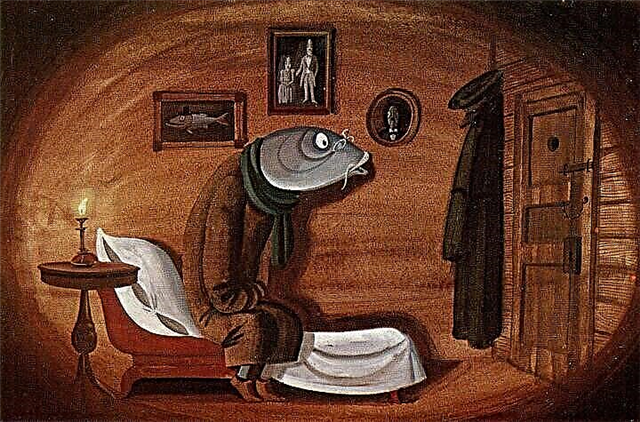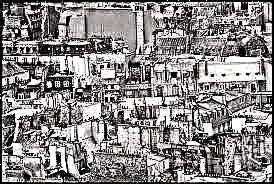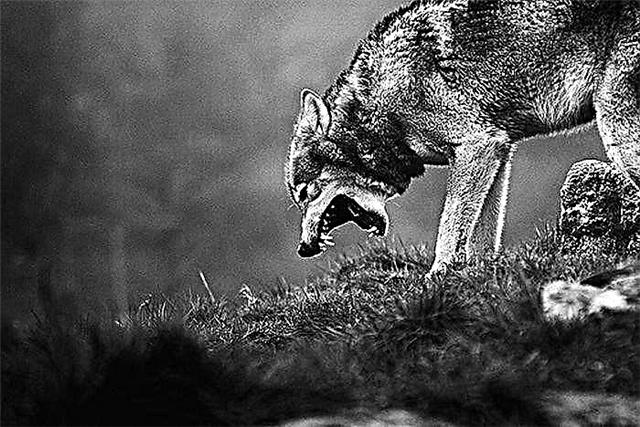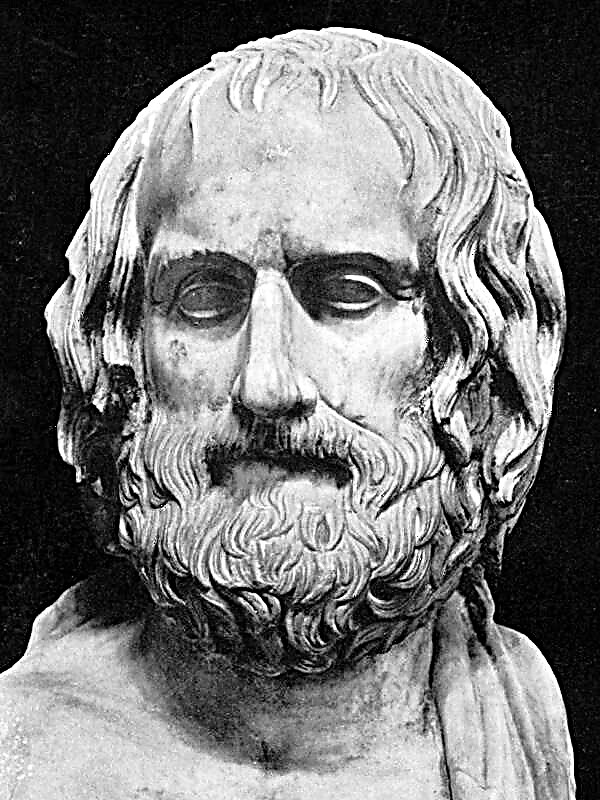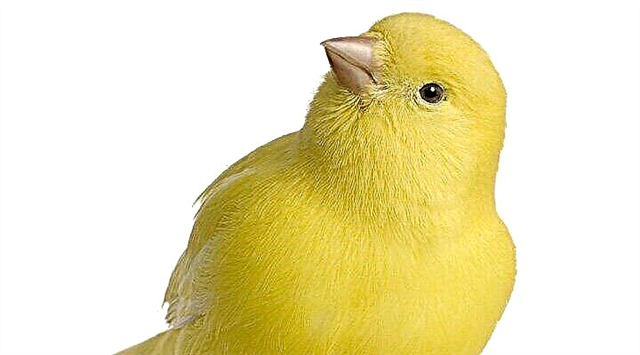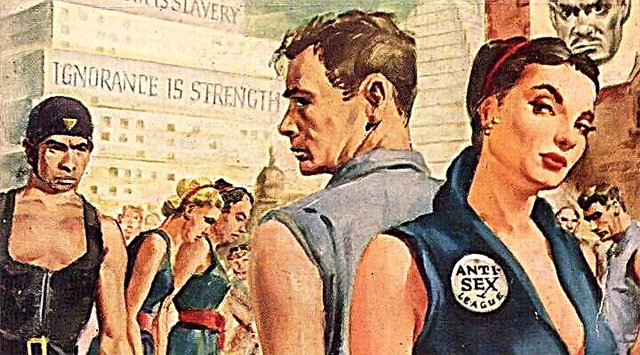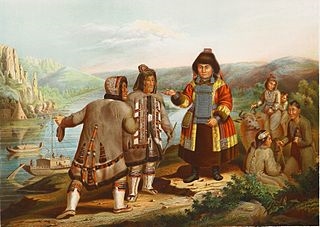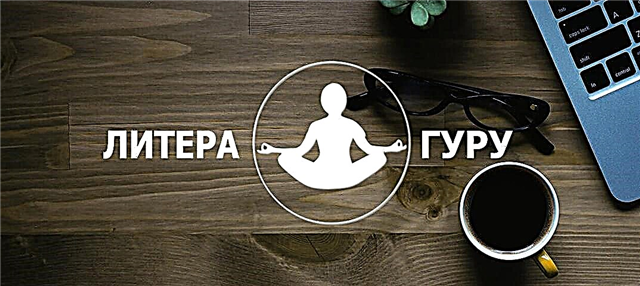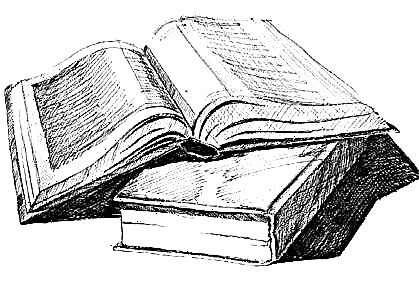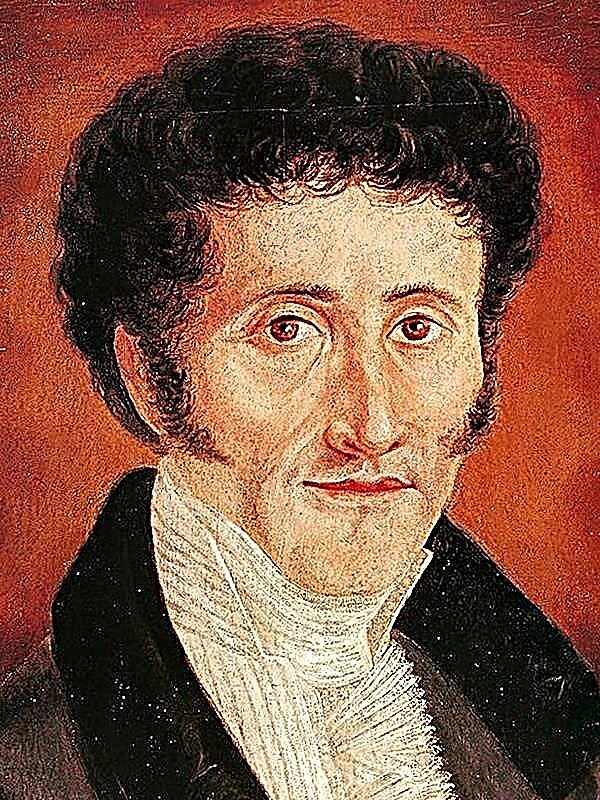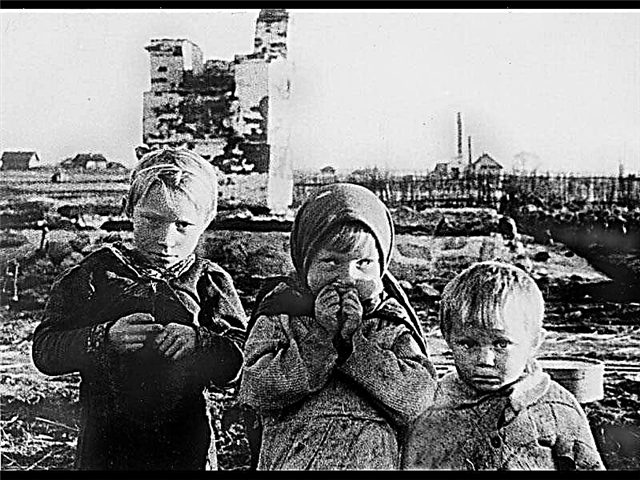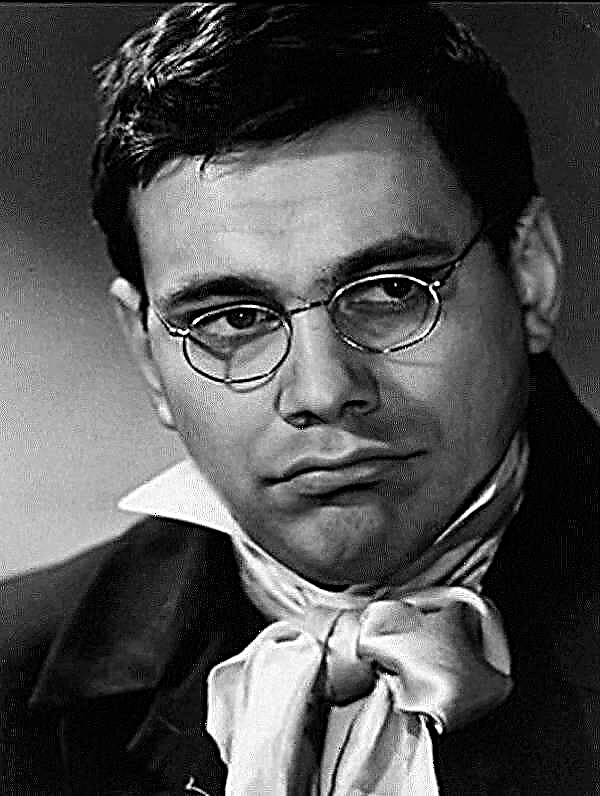One spring, I sat in Mariinsky Park and read Stevenson's Treasure Island. Sister Galya sat next to her and read. Her summer hat with green ribbons lay on a bench. The wind stirred the ribbons, Galya was short-sighted, very trusting, and it was almost impossible to get her out of her good-natured state.
It rained in the morning, but now the clear sky of spring shone above us. Only from the lilac did late drops of rain fly.
A girl with bows in her hair stopped against us and began to jump over a rope. She prevented me from reading. I shook the lilac. A little rain fell noisily on the girl and on Galya. The girl showed me her tongue and ran away, and Galya shook off a drop of rain from a book and continued to read.
And at that moment I saw a man who poisoned me with dreams for a long time about my pipe future.
A tall midshipman walked easily along the alley with a tanned, calm face. A straight black broadsword hung from his patent leather belt. Black ribbons with bronze anchors fluttered from the quiet wind. He was all in black. Only the bright gold of the stripes set off its strict form.
In land Kiev, where we hardly saw sailors, he was an alien from the distant legendary world of winged ships, the frigate "Pallas", from the world of all oceans, seas, all port cities, all winds and all the charm that were associated with the picturesque work of sailors . An ancient broadsword with a black hilt as if appeared in the Mariinsky Park from the pages of Stevenson.
The midshipman walked past, crunching along the sand. I got up and followed him. Galya did not notice my disappearance by myopia.
My whole dream of the sea was embodied in this man. I often imagined seas, foggy and golden from the evening calm, distant voyages, when the whole world changes, like a fast kaleidoscope, behind the windows of a porthole. My God, if anyone had guessed to give me at least a piece of petrified rust, broken from the old anchor! I would keep it like a jewel.
The midshipman looked around. On the black ribbon of his cap, I read the mysterious word: "Azimuth." Later I learned that the Baltic Fleet training ship was called that.
I followed him along Elizavetinskaya street, then along Institutskaya and Nikolaevskaya. The midshipman gracefully and casually saluted the infantry officers. I was ashamed in front of him for these baggy Kiev warriors.
Several times the midshipman looked around, and at the corner of Meringovsky he stopped and called me.
“Boy,” he asked mockingly, “why did you drag me in tow?”
I blushed and did not answer.
“Everything is clear: he dreams of being a sailor,” guessed the midshipman, for some reason speaking about me in the third person.
“I am shortsighted,” I answered in a fallen voice. The midshipman put a thin hand on my shoulder.
- Let's get to Khreshchatyk.
We went near. I was afraid to raise my eyes and saw only sturdy boots of the midshipman polished to an incredible sheen.
On Khreshchatyk, the midshipman came with me to the Semadeni coffee shop, ordered two portions of pistachio ice cream and two glasses of water. We were served ice cream on a small three-legged marble table. It was very cold and all covered with numbers: exchange dealers gathered at Semadeni and calculated their profits and losses on the tables.
We silently ate ice cream. Midshipman took a photograph of a magnificent corvette with sailing equipment and a wide pipe from his wallet and handed it to me.
- Take it as a keepsake. This is my ship. I went on it to Liverpool.
He shook my hand tightly and left. I sat still a little while sweaty neighbors began to look at me inboater. Then I went awkwardly and ran to Mariinsky Park. The bench was empty. Galya is gone. I guessed that the midshipman felt sorry for me, and for the first time I learned that pity left a bitter aftertaste in my soul.
After this meeting, the desire to become a sailor tormented me for many years. I was eager for the sea. The first time I saw him briefly in Novorossiysk, where I went for several days with my father. But that was not enough.
For hours I sat over the atlas, examined the coasts of the oceans, sought out unknown coastal towns, capes, islands, and river mouths.
I came up with a difficult game. I made a long list of ships with sonorous names: "North Star", "Walter Scott", "Khingan", "Sirius". This list has swelled every day. I was the owner of the largest fleet in the world.
Of course, I sat in my steamboat office, in the smoke of cigars, among the colorful posters and schedules. Wide windows overlooked, naturally, the embankment. Yellow masts of steamboats stuck out near the windows, and good-looking elms roared outside the walls. Steamboat smoke cheerfully flew through the windows, mingling with the smell of rotten brine and brand new, funny mats.
I came up with a list of amazing voyages for my ships. There was not the most forgotten corner of the earth wherever they went. They even visited the island of Tristan da Cunhue.
I took off steamers from one voyage and sent to another. I watched the sailing of my ships and I knew correctly where the Admiral Istomin is today and the Flying Dutchman: Istomin loads bananas in Singapore and the Flying Dutchman unloads flour in the Faroe Islands.
In order to manage such an extensive shipping company, I needed a lot of knowledge. I read out guides, ship handbooks and everything that had at least distant contact with the sea.
Then for the first time I heard from my mother the word "meningitis."
“He will reach God knows what with his games,” Mom once said. - No matter how it all ends in meningitis.
I heard that meningitis is a disease of boys who have learned to read too early. So I just grinned at my mother’s fears.
It all ended with the fact that the parents decided to go with the whole family to the sea for the summer.
Now I guess that my mother hoped to cure me of this trip from excessive passion for the sea. She thought that I would, as always, be disappointed in a direct encounter with what I had so longed for in my dreams. And she was right, but only partly.
One day my mother solemnly announced that the other day we were leaving all summer for the Black Sea, in the small town of Gelendzhik, near Novorossiysk.
Perhaps it was impossible to choose a better place than Gelendzhik in order to disappoint me in my fascination with the sea and the south.
Gelendzhik was then a very dusty and hot town without any vegetation. All greenery for many kilometers around was destroyed by cruel Novorossiysk winds - the Nord-Osts. Only prickly hold-tree bushes and stunted acacia with yellow dry flowers grew in the front gardens. From the high mountains pulled heat. At the end of the bay, a cement plant smoked.
But Gelendzhik Bay was very good. In its clear and warm water, large jellyfish swam like pink and blue flowers. Spotted flounders and bull-eyed gobies lay on the sandy bottom. The surf threw ashore red algae, rotten balberka floats from fishing nets and pieces of dark green bottles rolled around in waves.
The sea after Gelendzhik has not lost its charm for me. It has become only simpler and thus more beautiful than in my elegant dreams.
In Gelendzhik, I became friends with the elderly boatman Anastas. He was a Greek, originally from the city of Volo. He had a new sailboat, white with a red keel and grating washed up to gray.
Anastas rode on a boat for summer residents. He was famous for his dexterity and composure, and my mother sometimes let me go alone with Anastas.
Once Anastas went out of the bay with me to the open sea. I will never forget the horror and delight that I experienced when the sail, having inflated, tipped the boat so low that water rushed at the side of the boat. Noisy huge ramparts rolled towards, shining with greenery and brushing face with salty dust.
I grabbed forguys, I wanted to go back to shore, but Anastas, holding his pipe with his teeth, purred something, and then asked:
- How much did your mother give for these dudes? Ah, good dudes!
He nodded at my soft Caucasian shoes - dudes. My legs were trembling. I didn’t answer anything. Anastas yawned and said:
- Nothing! Small shower, warm shower. You will have lunch with an appetite. No need to ask - eat for dad mom!
He casually and confidently turned the boat. She scooped up water, and we rushed to the bay, diving and jumping out on the crests of the waves. They left the stern with a menacing noise. My heart was falling and dying.
Suddenly Anastas began to sing. I stopped trembling and listened to this song in bewilderment:
From Batum to Sukhum-Ay-wai-wai!
From Sukhum to Batum-Ay-wai-wai!
The boy ran, dragged the box -Ai-wai-wai!
The boy fell, broke the box -Ai-wai-wai!
To this song, we lowered the sail and from dispersal we quickly approached the marina, where the pale mother was waiting. Anastas picked me up, put me on the pier and said:
“Now you have it salty, madam.” Already has a habit of the sea.
One day, my father hired a ruler, and we drove from Gelendzhik to Mikhailovsky Pass.
At first, the gravel road ran along the slope of the bare and dusty mountains. We drove bridges over ravines, where there was not a drop of water. On the mountains all day lying, clinging to the peaks, the same clouds of gray dry cotton wool.
I was thirsty. The red-haired Cossack cabman turned around and said that I should wait until the pass - there I would drink tasty and cold water. But I did not believe the cabman. The dry mountains and lack of water scared me. I looked longingly at the dark and fresh strip of the sea. It was impossible to get drunk from it, but at least it was possible to bathe in its cool water.
The road climbed higher and higher. Suddenly, we were drawn into the face with freshness.
- The most pass! - said the cabman, stopped the horses, tears and put iron brakes under the wheels.
From the crest of the mountain we saw huge and dense forests. They stretched in waves through the mountains to the horizon. Red granite cliffs protruded from the greenery in some places, and in the distance I saw a peak burning with ice and snow.
“Nord-Ost does not reach here,” said the cabman. - Here is paradise!
The line began to descend. Immediately a thick shadow covered us. We heard in the impassable thicket of trees the murmur of water, the whistling of birds and the rustle of foliage excited by the midday wind.
The lower we went, the thicker the forest became and the shadeier the Road. A clear stream was already running along its side. He washed colorful stones, touched lilac flowers with his stream and made them bow and tremble, but he could not tear him from stony ground and take him down to the gorge.
Mom got water from a stream in a mug and gave me a drink. The water was so cold that the mug immediately covered with sweat.
“It smells like ozone,” my father said.
I took a deep breath. I did not know how it smelled around, but it seemed to me that they had filled up with a heap of branches moistened with fragrant rain.
Creepers clung to our heads. And here and there, on the slopes of the road, some shaggy flower protruded from beneath the stone and looked with curiosity at our ruler and at the gray horses, their heads lifted up and stood solemnly, as in a parade, so as not to jump off and roll the ruler.
“There is a lizard!” - said mom. Where?
- Over there. See the hazel? And to the left is a red stone in the grass. See above. See the yellow corolla? This is azalea. Just to the right of the azalea, on a fallen beech, near the root itself. There, you see, such a shaggy red root in dry land and some tiny blue flowers? So next to him.
I saw a lizard. But while I found it, I made a wonderful journey through hazel, red stone, azalea flower and fallen beech.
“So here he is, the Caucasus!” I thought.
- Here is paradise! The cabman repeated, turning off the highway onto a grassy narrow clearing in the forest. - Now we will straighten the horses, we will swim.
We drove into such a thicket and the branches hit us in the face so that we had to stop the horses, get off the line and walk on foot. The line slowly drove after us.
We went to a clearing in a green gorge. Like white islands, crowds of tall dandelions stood in the lush grass. Under the thick beeches, we saw an old empty barn. He stood on the bank of a noisy mountain stream. She poured transparent water over the stones tightly, hissing and dragging a lot of air bubbles along with the water.
While the cabman straightened up and walked with his father for firewood, we washed in the river. Our faces after washing burned with heat.
We wanted to immediately go up the river, but my mother spread a tablecloth on the grass, took out provisions and said that until we eat, she would not let us go anywhere.
While choking, I ate ham sandwiches and cold rice porridge with raisins, but it turned out that I was in a hurry in vain - the stubborn copper kettle did not want to boil at the stake. It must be because the water from the rivulet was completely icy.
Then the kettle boiled so unexpectedly and violently that it filled a fire. We drank strong tea and began to rush father to go into the forest. The cabman said that one should be on the lookout, because there are a lot of wild boars in the forest. He explained to us that if we see small holes dug in the ground, these are places where wild boars sleep at night.
Mom was worried — she couldn’t go with us, she had shortness of breath — but the cab reassured her, noting that the boar had to be teased on purpose so that he would throw himself at the man.
We went up the river. We made our way through the thicket, stopped every minute and called for each other to show the granite pools knocked out by the river - trout flew with blue sparks, - huge green bugs with a long whiskers, frothy grumbling waterfalls, horsetails above our height, overgrown forest anemones and clearings. with peonies.
Borya came across a small dusty hole, similar to a baby bath. We carefully walked around her. Obviously, this was the place of an overnight wild boar.
Father stepped forward. He began to call us. We made our way through the buckthorn, bypassing the huge mossy boulders.
My father stood near a strange building, overgrown with blackberries. Four smoothly hewn gigantic stones were covered, like a roof, with a fifth hewn stone. It turned out to be a stone house. A hole was made in one of the side stones, but so small that even I could not crawl into it. There were several such stone buildings around.
“These are dolmens,” said the father. - The ancient burial grounds of the Scythians. Or maybe these are not burial grounds at all. Until now, scientists have not been able to find out who, why, and how they built these dolmens.
I was sure that dolmens are the dwellings of extinct dwarf people. But I did not tell my father about this, since Borya was with us: he would make me laugh.
We returned to Gelendzhik completely burnt by the sun, drunk from fatigue and forest air. I fell asleep and through a dream I felt a gasp of heat on me, and heard the distant murmur of the sea.
Since then, I have become in my imagination the owner of another magnificent country - the Caucasus. The fascination with Lermontov, the Abreks, Shamil began. Mom was again alarmed.
Now, in adulthood, I gratefully recall my childhood hobbies. They taught me a lot.
But I did not at all look like choking saliva from the excitement of noisy and addicted boys, who haunted no one. On the contrary, I was very shy and did not molest anyone with my hobbies.

